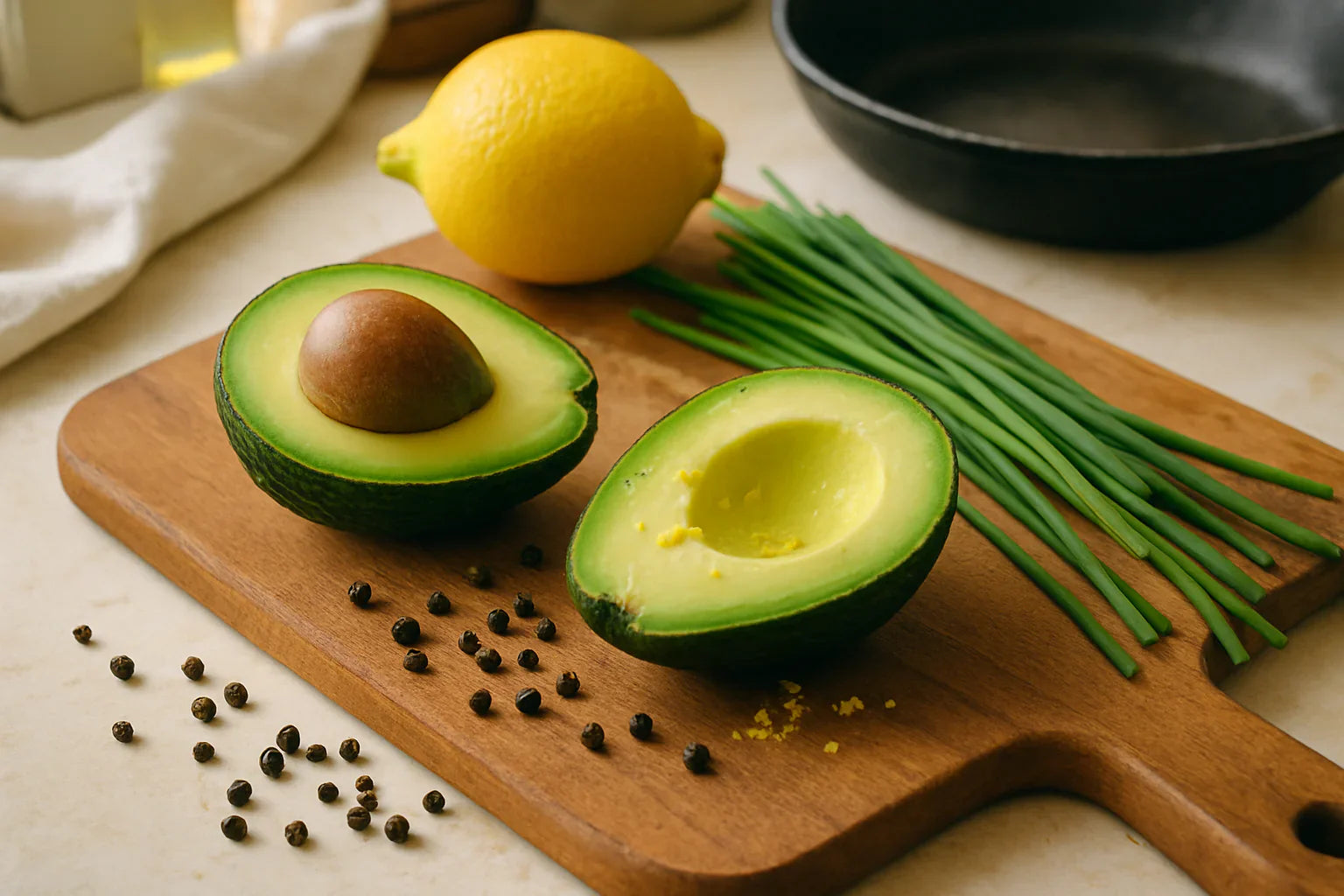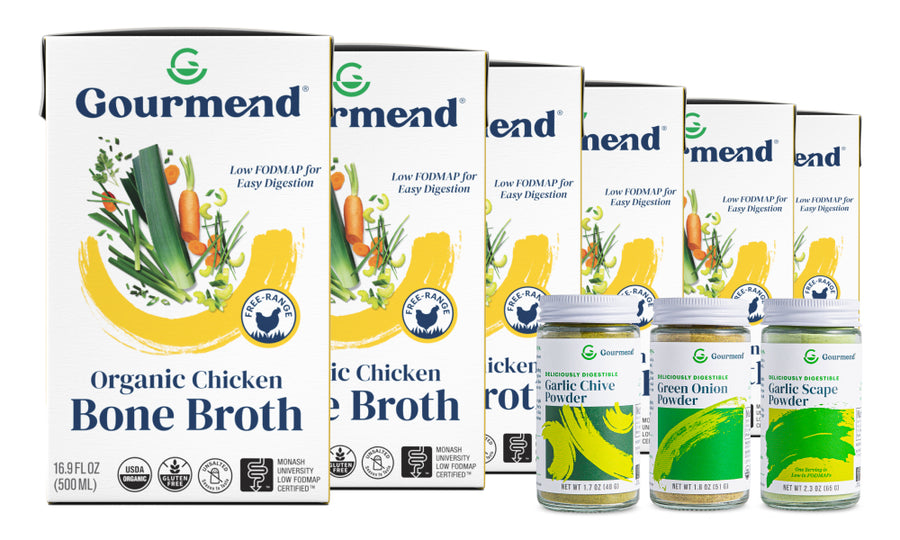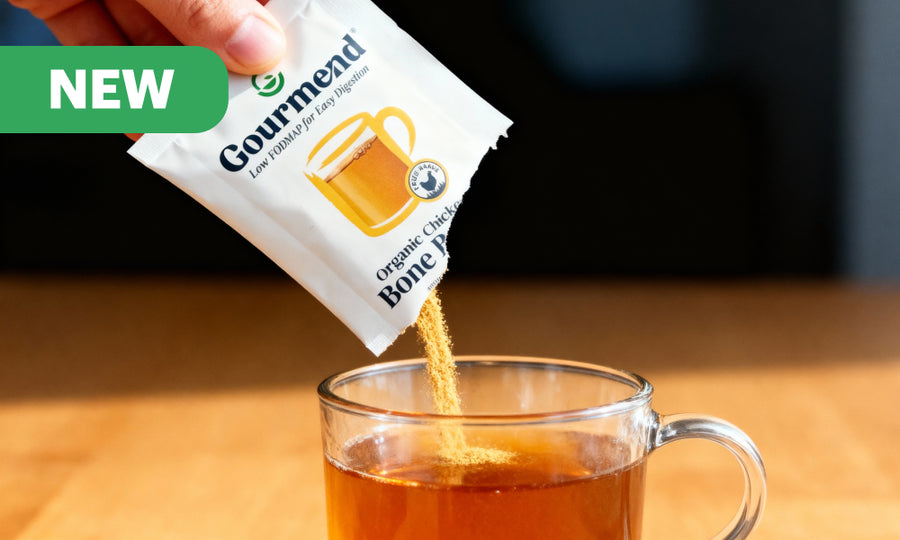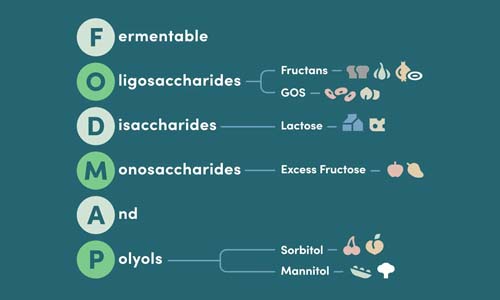Avocado FODMAP: 5 Essential Facts You Need to Know

Understanding Avocados and FODMAPs
If you're following a low FODMAP diet to manage IBS symptoms, you've probably wondered about avocados. These creamy, nutrient-dense fruits have become a staple in healthy eating, but their FODMAP status isn't as straightforward as you might think. With two-thirds of Americans experiencing digestive issues and nearly one billion people worldwide living with IBS, understanding how popular foods like avocados fit into a gut-friendly lifestyle is crucial.
Key Takeaways
- Avocados contain moderate levels of perseitol, a type of polyol FODMAP.
- Small servings of avocado (around 1/8 or 30g) are considered low FODMAP.
- Larger portions of avocado are high in FODMAPs and may trigger symptoms.
- The FODMAP content in avocados varies with ripeness, with ripe avocados generally having fewer FODMAPs.
- Understanding avocado’s FODMAP content is important for managing IBS symptoms effectively.
Table of Contents
The relationship between avocado FODMAP content has evolved significantly as research has advanced. What we once thought we knew about avocados and digestive comfort has been updated with new findings from leading FODMAP researchers. This means better guidance for anyone asking "are avocados low FODMAP?" or trying to navigate their symptoms while enjoying the foods they love. For a broader overview of FODMAPs and their impact on gut health, see our FODMAP blog.
What Are FODMAPs?
Definition and Types of FODMAPs
FODMAPs stands for Fermentable Oligo-, Di-, Mono-saccharides, and Polyols. These are short-chain carbohydrates that can trigger digestive symptoms in sensitive individuals. The main types include:
- Oligosaccharides
- Fructans and galacto-oligosaccharides (GOS) found in wheat, onions, and legumes
- Disaccharides
- Lactose found in dairy products
- Monosaccharides
- Excess fructose found in honey, apples, and high-fructose corn syrup
- Polyols
- Sorbitol, mannitol, and other sugar alcohols found in stone fruits and artificial sweeteners
Avocados primarily contain polyols, specifically a compound called perseitol that researchers have only recently begun to understand.
How FODMAPs Affect Digestion
FODMAPs are poorly absorbed in the small intestine, which creates two main digestive challenges. First, they draw water into the intestines through osmotic activity, potentially leading to loose stools or diarrhea. Second, when these unabsorbed carbohydrates reach the large intestine, gut bacteria ferment them rapidly, producing gas as a byproduct.
Symptoms Associated with High FODMAP Foods
When someone with IBS or gut sensitivities consumes high FODMAP foods, they may experience:
- Bloating and abdominal distension
- Excessive gas and flatulence
- Diarrhea or loose stools
- Abdominal pain and cramping
- Nausea or general digestive discomfort
These symptoms typically appear within 2-4 hours of eating, though timing can vary between individuals.
FODMAPs and IBS Symptom Management
Research shows that limiting high FODMAP foods can reduce IBS symptoms in about 70% of people. However, the low FODMAP approach isn't about permanent restriction—it's about identifying your personal triggers and tolerance levels.
The goal isn't to avoid FODMAPs forever, but to understand which ones affect you and in what quantities. This is why the low FODMAP diet includes careful reintroduction phases.
Individual thresholds vary significantly. Some people can tolerate moderate amounts of certain FODMAPs without symptoms, while others need to be more cautious. This individual variation is particularly important when it comes to foods like avocados, where serving size makes all the difference.
FODMAP Content in Avocados

Historical Perspective and Updated Research
The story of avocado FODMAP content illustrates how nutritional science continues to evolve. Early FODMAP research identified avocados as high in sorbitol, a polyol that can trigger digestive symptoms. This led to initial recommendations that people on low FODMAP diets should avoid or severely limit avocados.
However, recent testing by Monash University—the leading authority on FODMAP research—revealed something surprising. The main polyol in avocados isn't actually sorbitol, but rather a compound called perseitol. This discovery has significant implications for how we understand avocados' impact on digestive health. For more details on this research breakthrough, see Monash University's avocado and FODMAPs update.
Recent data suggests that ripe avocados contain little to no FODMAPs, while unripe avocados have measurable levels of fructose in addition to perseitol. This finding has led many FODMAP experts to recommend choosing fully ripe avocados when possible. You can also read more about recent avocado FODMAP research at A Little Bit Yummy.
Perseitol: What Is It?
Perseitol is a seven-carbon sugar alcohol that's naturally found in avocados. Unlike sorbitol, which has been extensively studied for its digestive effects, perseitol is relatively new to FODMAP research. What we do know is that as a polyol, perseitol likely affects digestion similarly to other sugar alcohols—it can draw water into the intestines and may be fermented by gut bacteria.
The discovery of perseitol has helped explain why some people's experiences with avocados didn't match the original high-sorbitol warnings. If you've been able to tolerate small amounts of avocado without symptoms, perseitol's different structure might be part of the reason. For more on the science behind FODMAPs and how they affect the body, check out our Learn blog.
Serving Size and Its Impact on FODMAP Levels
When it comes to avocado FODMAP content, serving size is absolutely critical. Current guidelines from Monash University and other FODMAP authorities provide clear recommendations:
| Serving Size | Weight | FODMAP Level | Recommendation |
|---|---|---|---|
| 1/8 avocado | ~20g | Low FODMAP | Generally well-tolerated |
| 1/4 avocado | ~40g | Moderate FODMAP | Use caution, test tolerance |
| 1/2 avocado | ~75g | High FODMAP | Avoid during elimination phase |
| Whole avocado | ~150g | Very High FODMAP | Likely to trigger symptoms |
FODMAP levels rise exponentially with serving size—the risk doesn't increase linearly. This means that doubling your portion doesn't just double your FODMAP load; it can multiply it several times over.
Some sources report that ripe avocados are lower in FODMAPs than unripe ones, though this can vary by variety and growing conditions. When in doubt, choose fully ripe avocados and stick to smaller portions.
Remember: Avocado oil contains no FODMAPs and is completely safe for all phases of the low FODMAP diet. It's a great way to get that rich avocado flavor without any digestive concerns.
Other Nutritional Factors – Fat Content
Beyond FODMAPs, avocados present another consideration for people with IBS: they're exceptionally high in healthy fats. While these monounsaturated fats offer cardiovascular benefits, they can trigger symptoms in some individuals with IBS, regardless of FODMAP content.
Fat stimulates the gastrocolic reflex—a natural response that can speed up intestinal contractions. For people with IBS-D (diarrhea-predominant IBS), this can mean symptoms even from low FODMAP portions of avocado. For delicious ways to enjoy low FODMAP meals that pair well with avocado, explore our low FODMAP recipes.
Managing Avocado Intake on a Low FODMAP Diet

Phases of a Low FODMAP Diet and Avocado Consumption
The low FODMAP diet consists of three distinct phases, and your approach to avocados should change with each one:
- Elimination Phase (2-6 weeks)
- Stick strictly to low FODMAP serving sizes (1/8 avocado or about 20g) or avoid avocados entirely if you're being very conservative. This phase helps establish your baseline symptoms.
- Reintroduction Phase (6-12 weeks)
- Gradually test larger portions of avocado to assess your personal tolerance. Start with 1/4 avocado and monitor symptoms for 2-3 days before trying larger amounts.
- Personalization Phase (ongoing)
- Incorporate avocados at your discovered tolerance level. Some people can handle 1/2 avocado without issues, while others need to stick to smaller portions.
Portion Control Guidelines
Successful avocado enjoyment on a low FODMAP diet comes down to smart portion management. Here's what research and clinical experience suggest:
- Start small: Begin with 1/8 avocado (20g) during elimination
- Space out servings: Wait 2-3 hours between FODMAP-containing foods to avoid "FODMAP stacking"
- Use measuring tools: A kitchen scale is more accurate than eyeballing portions
- Track your intake: Monitor total FODMAP load from all sources throughout the day
- Choose ripe fruit: Fully ripe avocados tend to be lower in FODMAPs
FODMAP stacking occurs when you consume multiple moderate-FODMAP foods close together, creating a cumulative effect that can trigger symptoms even when individual portions are within guidelines.
Practical Ways to Enjoy Avocado (at Low FODMAP Servings)
Small portions of avocado can still deliver big flavor and satisfaction when used strategically:
Smashed Avocado Toast
Use 1/8 avocado on gluten-free bread, enhanced with fresh herbs like chives or basil. A squeeze of lemon juice and a pinch of sea salt make this feel indulgent despite the small portion.
Measured Avocado Cubes in Salads
Pre-cut your avocado into measured portions and add them to salads throughout the week. The creamy texture adds richness that makes vegetables more satisfying.
Low FODMAP Guacamole
Make guacamole using measured avocado portions, lime juice, and gut-friendly seasonings. Our low FODMAP recipes include several guacamole variations that maximize flavor while respecting portion limits. For a creative avocado salsa to pair with your meals, try our Low FODMAP Tomatillo Salsa.
Smoothies with Measured Avocado
A small amount of avocado (1/8 to 1/4) adds incredible creaminess to smoothies without overwhelming the flavor. Pair with low FODMAP fruits like strawberries or oranges.
Tips for Storing and Using Avocado Efficiently
Since you'll be using smaller portions, efficient storage becomes crucial to prevent waste:
Brush cut avocado surfaces with lemon or lime juice, then wrap tightly in plastic wrap. Store in the refrigerator for up to 2-3 days. The citric acid prevents browning and adds complementary flavor.
For longer storage, blend measured portions of ripe avocado with a small amount of lemon juice and freeze in ice cube trays. These frozen cubes work perfectly in smoothies and can be thawed for other uses.
Consider using avocado oil as a FODMAP-free alternative when you want that rich, buttery flavor without any digestive concerns. Avocado oil works beautifully in salad dressings, for cooking, and even drizzled over finished dishes.
Key Takeaways and Final Thoughts
Understanding avocado FODMAP content doesn't have to mean giving up this nutritious fruit entirely. The key lies in recognizing that portion size makes all the difference between digestive comfort and symptoms.
Here's what you need to remember when incorporating avocados into your low FODMAP lifestyle:
- Serving size is everything: 1/8 avocado (20g) is generally low FODMAP, while 1/2 avocado or more becomes high FODMAP
- Ripeness matters: Fully ripe avocados tend to be lower in FODMAPs than unripe ones
- Individual tolerance varies: Some people can handle larger portions during the personalization phase
- Fat content is a separate consideration: High fat content can trigger IBS symptoms independent of FODMAP levels
- Avocado oil is FODMAP-free: A perfect alternative when you want the flavor without any digestive concerns
The research on avocado FODMAPs continues to evolve. What we once thought was a high-sorbitol food has been reclassified based on better understanding of perseitol. This reminds us why staying updated with trusted resources like the Monash University Low FODMAP App is crucial for anyone managing IBS through diet. For more meal ideas and inspiration, browse our Low FODMAP Recipes blog.
Remember that the low FODMAP diet is meant to be a temporary diagnostic tool, not a permanent restriction. The goal is to identify your personal triggers and build a sustainable way of eating that includes as many foods as possible.
For many of our customers at Gourmend Foods, learning to navigate foods like avocados represents a turning point in their relationship with eating. Instead of fear-based avoidance, they develop confidence through knowledge and careful experimentation.
Additional Resources
Tools & References
Staying informed about FODMAP research requires reliable, up-to-date resources. Here are the tools we recommend for accurate information:
- Monash University Low FODMAP App
- The gold standard for current food ratings and serving sizes. Updated regularly as new research emerges, this app provides the most reliable FODMAP information available.
- FODMAP Friendly Certification Program
- Look for products with FODMAP Friendly certification for tested, verified low FODMAP options. This certification provides additional confidence when shopping.
- Registered Dietitians Specializing in IBS
- Working with a qualified professional can help you navigate the three phases of the low FODMAP diet more effectively and avoid common mistakes that can prolong symptoms.
Further Reading & Recipes
Practical application makes all the difference when managing a low FODMAP diet. These resources can help you put your avocado knowledge into action:
Our low FODMAP recipe collection includes several avocado-containing dishes that respect portion guidelines while maximizing flavor. From measured guacamole to avocado-enhanced salads, these recipes prove that small portions can still deliver big satisfaction.
The low FODMAP recipe conversion tool is particularly valuable when you want to adapt your favorite avocado recipes. This tool helps you identify problematic ingredients and suggests gut-friendly alternatives that maintain the dish's original appeal.
Support & Community
Managing IBS and following a low FODMAP diet can feel isolating, but you're not alone. Building a support network makes the journey more manageable and sustainable.
Online IBS support communities provide valuable peer support and practical tips from people who understand the daily challenges of managing digestive symptoms. Many members share their experiences with specific foods like avocados, offering real-world insights that complement clinical research.
Meal-planning resources specifically designed for low FODMAP eating can help you incorporate foods like avocados strategically throughout your week. Planning ahead ensures you can enjoy variety while respecting portion limits and avoiding FODMAP stacking. For more inspiration, try our Low FODMAP Miso Salmon recipe for a satisfying, gut-friendly meal.
At Gourmend Foods, we understand that managing digestive health goes beyond just avoiding trigger foods—it's about rediscovering the joy of eating without fear. Whether you're measuring out your daily avocado portion or exploring new gut-friendly ingredients, every small step builds confidence and expands your culinary possibilities.
The goal isn't perfect adherence to every guideline—it's finding a sustainable approach that allows you to enjoy food while feeling your best. Small portions of avocado can absolutely be part of that balanced approach for most people.
Check out our Low Fodmap Bundles
Frequently Asked Questions
Is avocado FODMAP friendly?
Avocado contains different types of FODMAPs depending on the portion size. Small servings—about 1/8 to 1/4 of a whole avocado—are generally considered low FODMAP and should be well tolerated. Larger portions can contain higher amounts of sorbitol, a sugar alcohol that can trigger symptoms in sensitive individuals.
Are avocados a trigger for IBS?
For many people with IBS, avocados can be a trigger if eaten in large amounts due to their sorbitol content. However, moderate portions often fit within a low FODMAP diet and don’t cause symptoms. It’s all about finding the right balance for your gut.
Do avocados cause gas and bloating?
Avocados can cause gas and bloating if consumed in excess because of their sorbitol, which is fermented by gut bacteria. Keeping servings small helps reduce these symptoms, making avocado a flavorful addition without digestive discomfort.
Is avocado gut friendly?
In controlled amounts, avocado is gut friendly. It provides healthy fats, fiber, and important nutrients, supporting digestive health without triggering common IBS symptoms when portion sizes are managed carefully.
Why does my stomach hurt after eating avocado?
Stomach discomfort after eating avocado often comes from its sorbitol content, which some people with sensitive guts struggle to digest. Overeating avocado or combining it with other high FODMAP foods can increase symptoms like cramping or bloating.
Are eggs bad for FODMAP?
Eggs are naturally free of FODMAPs, making them a safe, gut-friendly protein choice for people managing IBS and digestive issues. They’re versatile, easy to digest, and fit well into a low FODMAP diet without causing symptoms.





